StoryTo say Juuni Kokki merely impressed me would be blatant understatement; nay, if anything, it completely awed me. Without a doubt the best fantasy anime ever to grace the airwaves, its aural sense of sovereignty sets it on pedestal far above its contemporaries. While not absolutely perfect, as far as novel-to-screenplay transitions go Juuni Kokki is the cream of the crop, as its only real restrictions arise from its inability to capture the entire breadth of its epic within the scope of an anime series.Though to some this might sound like flagrant patronization, Juuni Kokki stands on its own two feet without the need for hype or flattery. To begin with, it oozes with layer upon layer of lore, which discounts the need for any fluff or filler material. In fact, the prime purpose of the series is not simply to tell a story, but rather to completely immerse the viewer in a strange and tantalizing world. Yet, as deep as the lore goes, come the end it feels as if the story only barely manages to scratch the surface, as it seems as if the many happenings are but an introduction to a much grander epic. All throughout the tale the viewer is lavished with the intricacies of the Twelve Kingdoms, ranging from the destinies of the mythical kirin to the immortality pacts of the revered sen-nin. Ultimately it feels as if the story itself assimilates the viewer into its workings, which culminates in the sensation that he or she, personally, is at the receiving end of its bountiful narration. And yet, even with its profuse amount of description and detail, not once does it touch upon blandness or monotony. The story is told through two distinctly different methods: active following and passive narration. Of the two, the former encompasses about two-thirds of its content, and follows the story of a young girl, Youko, who is unwillingly swept into another world. While this premise has been approached time and time again, the primary difference with Juuni Kokki is that this proves to be an insignificant, and actually rather menial, subsection of the plot. As such, the world lacks apocalyptic catastrophes for her to prevent or grand evils for her to quell, and instead poses a much more realistic (and subsequently intriguing) array of trials for her to overcome - she must take up her duties as queen and lead her kingdom. This opens the door for a fantastic amount of character growth, as from the get-go she hardly seems fit to hold a position of such stature. From her faults to her virtues, she evolves and matures in a believable fashion, which culminates with her story bearing a remarkable amount of grace and elegance. For the remaining third of the story, however, Youko's direct involvement is minimal. Comprised of an assortment of relatively brief narratives, it details important characters and events elsewhere in the world, and provides background to certain concepts like the aforementioned kirin. Since Youko's story revolves heavily around her kingdom of Kei, they generally touch up other nations such as Tai or En, which broadens the scope of the series quite drastically to give it its epic grandeur. In addition, being that Juuni Kokki employs a huge, custom-built vocabulary bank, they help to constantly clarify names and terminology without drifting into the realm of tedium. Despite the overwhelming amount of material presented, it's all clear, concise, and easily understood, leaving no need to ever backtrack due to confusion. Sadly, Juuni Kokki does suffer from one fault, though: it is not complete. Even so, it does not conclude whimsically or subtly - quite the contrary. Of the series' three major arcs, the final one ends powerfully and distinctly, and is certainly satisfactory (at the very least.) Though it fails to tie up many loose ends, however, this largely stems from the fact that Fuyumi Ono (the author of the source novels) stopped writing the books; as is, the anime covers the majority of the original content, and for that I have no qualms.AnimationThough Juuni Kokki's animation has begun to show a bit of agedness, by no means has it entirely lost its luster. A number of a scenes look absolutely beautiful, and overall the character and youma designs flaunt an enormous amount of appeal. Detail abounds in droves, especially in the gradual visual shift in Youko's appearance over the course of the first arc. While, as a whole, the visual score lacks any particular outstanding qualities, overall the animation proves enormously appropriate to the setting it attempts to portray, and that ultimately compensates for any minor quirks the series' might have in this category.SoundFrom the first minute and thirty-six seconds of Junni Kokki, I must admit it managed to grasp my full attention. The opening sequence is an assortment of medieval Chinese-styled paintings accompanied by a magnificently epic musical piece; it begins calmly and serenely by passing over a sky filled with kirin, followed by a shift to a battlefield as the song reaches its climatic overture. The very essence of the series is captured with this piece alone and, fortunately, it is but one of many to come - the entire soundtrack is awash with audible splendor. With its Chinese origins comes an abundance of similarly styled musical tracks, and each and every one fits perfectly with its thematic feel. Probably one of my favorite soundtracks to date, it easily earns all the glowing praise it deserves; it's not to be missed. As an added bonus, too, the voice acting pans out to superb. Given that lengthy narration accompanies a fair portion of Juuni Kokki's tale, I found this to be a vital aspect of its audible quality. Each individual voice matches his or her respective personality quite well, ranging in scope to encompass every subtly Keiki's reserve to King En's charismatic spirit. Youko's seiyuu, especially, captured the shifts within her personality, as her vocal transition from hesitancy to confidence fueled much of her character's overall strength. CharactersWhile on the topic of Youko, too, might I just say she is one of the most amazing characters I have had to fortune of experiencing - I don't know where to even begin. Simply put, without dwelling too much on the details in risk of revealing too much about her, her growth from start to finish proves an absolute delight to watch take place. Initially indecisive and cowardly, she hardly fits the role of a queen; quite the opposite, in fact, since she lacks a single ounce of charisma. Yet, as she faces hardships and is forced to adapt to a completely foreign set of cultures and customs, her cowardice slowly metamorphs into courage, her naïveté into wisdom, and ultimately completes her evolution from caterpillar to butterfly in glorious fashion. Her character progression flows together with enormous finesse, and for that I have nothing but respect for her design.Yet, though even by herself she would have been great, her compliment of remarkable side characters makes for an astounding overall cast. Though perhaps lacking an abundance of innate depth due to their numbers, these characters are nevertheless wonderfully developed in the sense that they play off one another in a very symbiotic fashion. Rakushun, for instance, does little on his own; however, when paired with Youko, his simple, compassionate persona expands to showcase his tact and wisdom in a very compelling fashion. Nearly all the characters influence one another in this manner, which creates a strong sense of depth amidst them as a whole in lieu of their individual shortcomings. The resulting web of relationships makes the world come alive in a mature and believable fashion, and contributes quite substantially to the strength of Juuni Kokki as a whole.OverallJuuni Kokki can, invariably, be categorized within the top echelon of anime to have been produced to date, and likely will retain such status for decades to come. Perhaps its only fault lies within its incompleteness, but that hardly phases the sheer intrigue of both its world and its characters. All in all, I can give Juuni Kokki nothing less than my highest recommendations - truly not to be missed.
 Screenshots
Screenshots

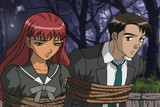
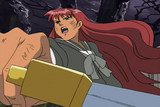
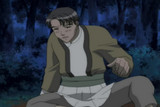
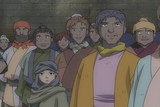
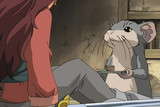
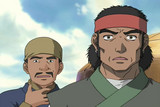
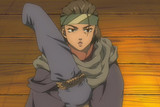
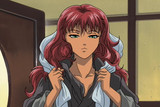
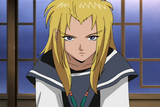
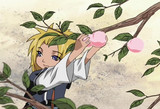
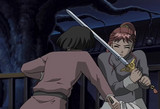
 Add to list
Add to list Add to list
Add to list Add to list
Add to list Add to list
Add to list Add to list
Add to list Add to list
Add to list Add to list
Add to list Add to list
Add to list Add to list
Add to list Add to list
Add to list Add to list
Add to list Add to list
Add to list Add to list
Add to list Add to list
Add to list















